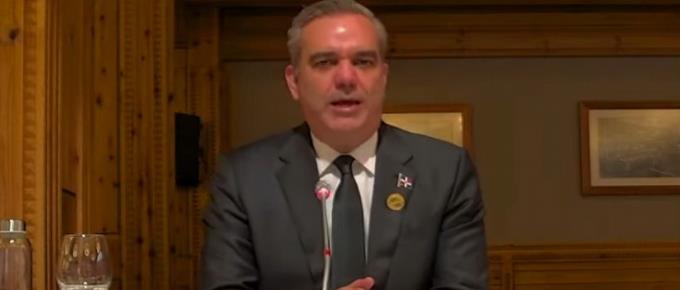Abenader explains that he’s not asking for humanitarian aid, but rather a model for vaccine production and redistribution.

President Louis Abenader denounced the distribution of vaccines against the Coronavirus, as rich countries unfairly monopolized them, and prevented access to low-income countries, in contradiction to any notion of human solidarity that stirs up time.
In his speech at the 27th Summit of Ibero-American Heads of State and Government, Abnader explained that they are not advocating humanitarian aid, and it is not a charitable fund, but rather a model for production and redistribution.
“Let it be clear. We are not advocating for humanitarian aid or charitable money. What we are proposing is an alliance for development that allows us to move as a region to a new production model and redistribution.”
He said that the sense of vulnerability they have discovered with the coronavirus makes the responsibility of the plant more apparent, and is leading governments to reverse the path they have taken so far.
“ However, despite the need for a renewed multilateral vision, in the process of distributing vaccines against Covid-19, “We have noticed that the richest countries have adopted hoarding policies that, in an unfortunate and unfair way, deny access to low and middle income countries, in contradiction to any notion of human solidarity,” the Dominican president said..
Abinader referred to the statement of the Economic Commission for Latin America and the Caribbean that, in order to face the health crisis caused by the Coronavirus, political and social charters that allow social protection and comprehensive health are required.
Here is a full speech:
Speech of President Abinader at the Ibero-American Summit
Dear friends,
At this time, our region and the world face great challenges that can only be addressed through renewed multilateralism. Indeed, in the face of the epidemic, the climate emergency, the technological transformation, and the need to forge a new model of the welfare state, it is necessary to strengthen the unity and cooperation of the Ibero-American peoples.
The Dominican government, like other countries, has made tremendous efforts to mitigate the effects of this health and economic crisis, allocating large sums of money to the most affected sectors of the population, so as not to be left without protection from loss of income. But in addition to this, we have deployed health resources to stop the further infection, and have successfully started the vaccination process.
Before the pandemic, however, the crisis of regionalism in Latin America was evident in the paralysis of the mechanisms of integration and disintegration that our countries have demonstrated in multilateral forums.
Likewise, a certain economic recession was observed in this period, especially in Latin America and the Caribbean, which in the period 2014-2019 recorded the lowest growth rate since the 1950s.
Dear Colleagues, These are extremely disturbing statements that compel us to redouble our efforts for regional integration and the promotion of pluralism.
To achieve this, there is an urgent need to reorient the priorities of public spending and the way we govern our societies. It is necessary to move towards a development model that seeks a more equitable distribution of the great wealth that humanity can generate today, the protection of human rights and the environment, as well as the modernization of democratic political institutions to new technologies.
This new paradigm must be directed towards protecting democracy and human rights and, above all, in the face of risks posed by inequality and crises, which, like the current model, generate significant pressure on democratic governance.
As the Economic Commission for Latin America and the Caribbean has stated: “To face the health crisis, there will be a need for political and social pacts built with the participation of a wide range of actors, making it possible to mainstream social protection and health …”.
The globalization of disease and crisis strengthened interconnectedness in the world. Diversity, fairness and solidarity are principles permeated with greater intensity in a more complex and diverse global social fabric.
The feeling of vulnerability, which we suddenly discover due to the virus, makes our responsibility to the planet all the more apparent, and should lead us to make decisions to reverse the path we have taken so far.
However, despite the need for a renewed, multilateral vision in the distribution of vaccines against Covid-19, we have observed that the richest countries have adopted hoarding policies that prevent, in an unfortunate and unfair way, access in less and middle-income countries, including It contradicts any notion of human solidarity.
Let it be clear. We are not advocating for humanitarian aid or charitable money. What we are proposing is an alliance for development that allows us to move as a region to a new production model and redistribution.
I cannot finish this speech without referring to the tourism sector, which has been, for us and other countries, the engine of economic growth for decades. This important sector is severely affected by the health crisis, and beyond this, in the Caribbean, the impacts of climate change are already being felt as degradation of marine ecosystems and rising sea levels devastate our shores.
My friends, The world has reached a turning point, which forces us to think of another development model that is fair, green and sustainable. We will succeed together or fail separately, the decision is ours alone. Thank you so much.

Typical creator. Subtly charming web advocate. Infuriatingly humble beer aficionado.






